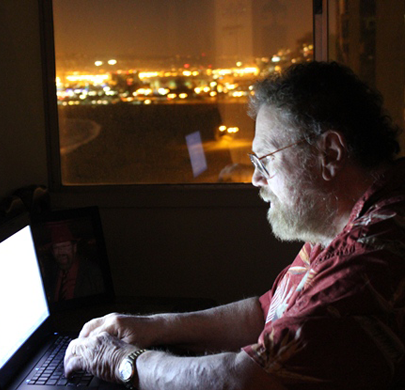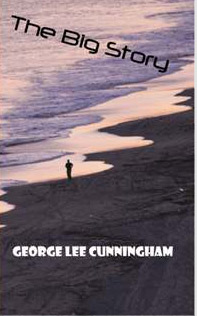FEATURED POSTS
-
November 28, 2020
Old Age

TODAY I TURN 80. IF LIFE WAS A CHESS MATCH, THIS WOULD BE THE TIME TO START PLANNING THE END GAME. BUT FUCK THAT! LIFE IS NOT A CHESS MATCH. LIFE IS AN ADVENTURE. BALLS OUT TO THE END. THAT’S MY PLAN, AND I’M STICKING TO IT.
-
October 7, 2020
REQUIEM FOR A TREE

BEFORE
We loved that 40-foot-high pine tree that shaded our patio all morning long, that provided a home to humming birds and sparrows, a high perch for crows and ravens to survey their domain, and a place for bugs and small critters that were a source of food for those birds. The tree grew in our neighbor’s yard, but we considered ourselves stakeholders in its presence.
We would gather beneath its sheltering boughs for morning coffee and conversation, our dog Henry would curl up on his outside bed and snooze, as we plotted new adventures, traded the latest neighborhood gossip, and poured more coffee.
But now our tree is gone, taking with it its welcome shade, the trill of the birds, and the majestic boughs that swung back and forth in the breeze above our heads. Our patio suddenly seems naked, exposed to the harsh and blinding rays of the morning sun.
The removal of the tree was sudden with little time to say good-bye. Our neighbors showed up at the door to announce the tree was coming down that day.
We had to leave that morning to meet our nieces and nephew for ice cream in Huntington Beach, and by the time we returned not only was the tree gone, but the branches that hung over our patio had been allowed to fall into our flower bed, crushing the plants below, including a Birthday rose – one of two that were a gift from Henry and me to my wife.
The workmen, who were still busy digging out roots, did not speak English, and we don’t beat up on employees, when the person we need to be yelling at is their boss.

AFTER
The removal of the tree left us both sad and disappointed, but that’s how it is when an old friend departs. You tend to forget all the bad things that went along with the good.
The deep shade of the tree made it difficult to grow our own flowers and plants, and the labyrinth of giant roots that supported the tree was slowly destroying the fence separating our backyard from the neighbors and undermining the foundation of our home. And some point in the future, those roots would also damage the plumbing that provides our water and destroy the underground system that drains away our waste – amenities that people nowadays take for granted.
There also was the daily onslaught of dead pine needles that showered down in our yard, pine needles that had to be swept off our patio daily, pine needles that lodged in the nooks and crannies of everything, spiny debris that fell across young flowers struggling to break through to the light, pine needles that defied attempts to rake them up without damaging all that grew beneath them.
And when the wind blew hard and strong as it often does in the pass between Mount San Gorgonio and Mount Jacinto, the boughs of the pine would whip back and forth, sending a shower of needles to cover our backyard with a thick prickly carpet of green and brown. If the tree were to snap, as a number have in the pass area, an obvious target would be not only our backyard but our home as well.
Still, an old friend is gone, and a new day begun.
After the tree came down we went to Lowes to buy a backyard umbrella, $150 plus with a concrete stand to anchor it to the ground. A poor substitute for the cooling boughs of the old pine and the constant twitter and trills from its inhabitants, but sufficient to provide a modicum of shade.
We are still digging pine needles out of the cracks and crannies of the backyard, but there is no daily onslaught of their spiny fallout.
Life goes on.
Not for the big tree, but hopefully the avian and insect creatures that called the tree home, will find new places to inhabit – hopefully in our yard.
Carmela, Henry, and I are still here, Carmela and I still drinking coffee in the morning and arguing about life, politics, and our next big adventure, while Henry snoozes on his bed.
Do you have an opinion on the subject? Contact me at george@georgeleecunningham.com and let me know. Meanwhile, you can always subscribe and get an email reminder of blog postings. Your name will not be shared and you may cancel at any time.
-
May 27, 2020
The Power of Magical Thinking
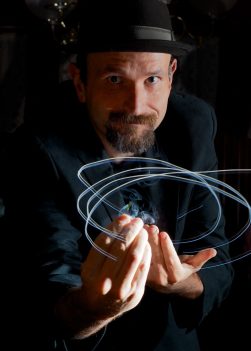
Photo by djwtwo on Foter.com / CC BY-NC-SA
Americans believe in magic. And why wouldn’t we? We lead lives of such privilege and prosperity that we have come to think of our place of dominance in the world and our style of life as a God-given right.
There may be places in the world where people are starving, where disease is rampant, and where human beings are killing one another in savage ways over nothing more than differences of opinion in how they worship. But not here. Not in America.
We’re special. And we have a government that is going to take care of us, no matter what.
That’s magical thinking. The truth is that the government can’t give us anything that it doesn’t take from us first. A bug from China (in fact, for the nitpickers, a submicroscopic infectious agent, not literally a bug) is infecting people, making them sick and sometimes even killing them – especially those who are old or in ill health to begin with.
So what do we do? Exactly what the government tells us to do. We lock ourselves away, and huge numbers of us start getting paid to do nothing. But, no matter how dangerous the virus may be, this can only go on for so long.
Right now – more than ten weeks into the shut down – many Americans keep insisting that we all stay home and that the economy stays locked up tight. To facilitate that, they’re expecting the government to keep making pay-outs to individuals and businesses – both big and small – to keep everything running.
The funny thing is that a lot of those same Americans, who think they and almost everybody else should stay home, still want some of their countrymen to go to work. They’re thinking that the doctors and nurses in hospitals, the people who work in grocery stores, truck drivers who deliver food to supermarkets, and the farmers and ranchers who grow the food should still keep hustling their butts. It’s OK though, because they are very, very grateful. They are happy to put signs in their windows and applaud public service messages about what super heroes those people are who are expected to be at their jobs. It’s a big, hearty “thank you” to the folks on the front line.
A lot of those “stay at home” people also want people who have been put out of work to get more money, they want everyone who wants to stay home to be compensated, and they want everybody on the government dole to get a raise. A BIG raise.
The problem is this. There is no magic. The government cannot actually create wealth. It can only take it from the wealth-creators – also known as taxpayers. Of course, the government can always turn on the presses and print some more dollars, but those freshly inked pieces of paper only make the dollars we already have less valuable. In other words, they cause inflation, making it a lot harder for Americans to buy things like food and clothes and cars and houses and everything else.
The economic shut down closed supply chains, food distribution lines, transportation services, government agencies and no end of other businesses that are required to get goods and services to the public. Getting food to market has become so logistically difficult and expensive that dairymen are dumping milk and ranchers and farmers are losing money on animals that they cannot get to market because of packing-plant closures. All that dumped milk and stranded meat adds up to two things – a shortage of food in the markets and much higher prices on the food that does show up.
So now steaks, Brussels sprouts, milk, chicken, and other items from soup to nuts is getting difficult to find and more expensive. And it’s going to get a lot worse – even after we open up the country. A shut-down supply chain takes a while to get back on track and up to speed.
The problem is that people believe what they want to believe and politicians will always be there to support Americans’ magic fantasies in an attempt to curry favor in exchange for votes.
Magical thinking goes far beyond the Corona virus.
My brother-in-law, a retired sheriff’s deputy, says all his law enforcement buddies are solidly for Trump and are sure he is going to win. But he recognizes that his law-and-order buds don’t necessarily reflect the society as a whole.
Not everybody is so perceptive.
If you were to go my wife Carmela’s former office at UCLA, you would be surrounded by people who think Trump is so stupid there is no way he can win.
We see what we want to see and believe what our friends and associates believe, so our view of the world tends to be somewhat skewed.
Remember when Japanese auto makers began taking over the market back in the 70s and 80s. American auto executives were lulled into a sad sense of complacency when they looked out at their company parking lot and saw row after row of American cars. They tended to gloss over the fact that their employees were entitled to deep discounts on the cars they helped build – and so they bought those cars and filled up the company parking lots while much of the rest of America had started buying the Japanese cars.
You see friends on Facebook, on both sides of the political divide, ranting about how stupid the other side is and reinforcing their own increasingly narrow point of view. Anybody who disagrees, even slightly, is instantly pummeled for his or her political blasphemy.
It’s both ugly and crazy. Here are the plain and unmagical facts.
The economy must immediately open and start producing goods and services to get those 30 million newly unemployed people off the government dole – and back to paying taxes.
The government must stop printing money and handing it out like drunken sailors.
And while we’re at it, we’ve all got to find a way to get along a little better. Disagreement is fine, and even healthy. Disrespect, acrimony and boorish screeching is not.
The world is what it is. We can either get along and recognize our differences or break apart and engage in a holy war over politics, money and culture. There is no magic.
And no amount of Abracadabra is going to change that.
Do you have an opinion on the subject? Contact me at george@georgeleecunningham.com and let me know. Meanwhile, you can always subscribe and get an email reminder of blog postings. Your name will not be shared and you may cancel at any time.
-
April 10, 2020
ONCE HOT, NOW NOT
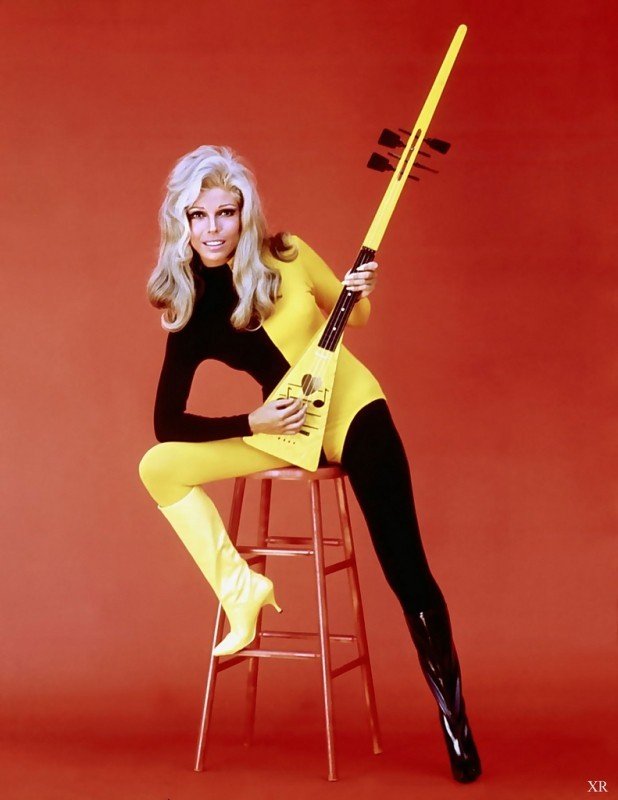
ARE YOU READY BOOTS, START WALKING – Photo by x-ray delta one on Foter.com / CC BY-NC-SA
One of the nice things about getting old is having been a witness to how things used to be and how they are now.
The older you get, the more you realize that what used to be cutting edge and cool, is now passé. Here are some things that people used to think were so cool, that now are terribly dated.
Home Life:
Did you ever try to get up from a bean bag chair after you’ve had a few drinks or perhaps been indulging in other substances that in the past could get you a shared cell with a biker named Bruno?
The bean bag chair was, and is, a completely useless piece of furniture, except maybe for kids. And yet, as a young man, I thought bean bag chairs were quite bohemian and cutting edge – not unlike beaded curtains, macramé wall hangings, and home-made sand candles.
It wasn’t just the young and stupid who defined the fashion of the day. Style was also defined by those old enough to know better.
If you ever lived in a home with a sunken living room, you know it was really an accident waiting to happen, especially if you had been indulging in alcoholic beverages. That was even more likely, because a sign of success was having your own well-stocked wet bar with stools, a stock of various liquors, and beer on tap.
We lived in a home at one time, in which the living room was one step down from the dining room. We worried all the time that a dinner guest would push his chair back to get up from the table and take a tumble onto the white shag carpet, one six-inch step below the dining room floor.
The television set used to be a giant box that sat prominently in the middle of an open-faced “entertainment center” that also featured stereo speakers, an AM-FM tuner, a turntable for records, a VCR and later a CD player for watching home videos or featured films, all stored on a side shelf, usually behind etched glass doors. Waterbeds in the 60s weighed hundreds of pounds and had heated pads so you didn’t freeze as you sloshed through the night.
And don’t get us started on the combination appliances – the stove, microwave, toaster oven, kitchen clock/timer all in one giant piece that required a major kitchen overhaul or replacement if any one of the elements went bad or became obsolete. And then there were the colors. Refrigerators used to be white, then for a period, avocado and gold became the kitchen colors of the day, before returning to white again and now stainless steel.
Those were the good old days. Or were they?
Fashion:
Remember mini-skirts, afro hair styles, tie-dyed shirts, bell-bottom pants, caftans for entertaining at home, fruit boots, business suits for women with linebacker padded shoulders and a blouse that featured a giant loopy bow instead of a tie. There were perms for men, big bouffant hair for women, and tight leather pants and fanny packs for both.
Many of these fashions – like all past passions – are still around, still embraced by folks who got stuck in a fashion time warp. Guys who are still carrying their cigarettes rolled up in a sleeve of their t-shirts, and old men and women still wandering around in tie-dyed shirts and shooting each other peace signs.
Fashion used to be dictated either from where you lived – such as overalls, cowboy hats, and bandanas – or sometimes from influential designers in Paris who developed a following and dictated the latest look. It was an industry built on conspicuous consumption. The more expensive the line one wore, the bigger the boost in one’s status.
Transportation:
Since Henry Ford started producing the Model T in 1908 – making automobiles available to the common man – Americans have been in love with their cars. There is nothing better than the open road, the sound of an internal combustion engine coming to life, and power available just by pushing down on a gas pedal.
A car isn’t just transportation. It is adventure; it is style; it is the freedom to go where you want, whenever you want, at the speed you want. You don’t have to sit on a bench waiting for a streetcar or bus, or at a train station platform waiting for a ride to take you to your destination. You jump into the car, turn on the key, and away you go.
As cars grew more elegant, each had its own style. White-wall tires, fender skirts, fancy hubcaps, gleaming hood ornaments that sparkled in the sun and lots of chrome, on the front and the back and down the sides. Lovely, flashy, dangerous Detroit steel, destined as time went by to become the boxy automobiles of today – fiberglass and plastic bodies designed with an eye toward safety and fuel efficiency.
The family station wagon, the sensible, safe, and boring version of the family sedan, was replaced by the mini-van.
Now the burning public desire for power and fossil-fuel muscle has been taken up by the big pickup trucks – some of them jacked up so high that you need a step-stool to get inside.
And yet, the love affair with the cars of the era lives on.
Much of what used to be family road trips to explore the highways and byways of America has been replaced with airplanes. Air travel was once exclusive and exciting. People dressed up to get on a plane because not everybody could afford it.
Now it has become a default way to travel, replacing buses and trains. What once was luxury has become agony with seats jammed as close together as physically possible and in-flight meals that are tasteless and expensive. Unless passengers are willing to pay big bucks for first class, they are lucky to get a bag of pretzels and a can of soda to ease their journey.
Media:
Before the internet, people used to read newspapers, books, and magazine articles printed on paper – both slick and pulp. They were able to do so because they were literate and had been taught at an early age to read and write.
Every big city had news and magazine stands with publications from around the world and book stores full of fiction and non-fiction works. Lovers of the printed word could gather for hours, looking at what selections were available and rubbing shoulders with other bibliophiles.
Almost every literate person had at least one daily newspaper delivered to their home.
The family would split up the sections, reading the National and International news, the Local news, the latest Sports scores, the Wall Street stock market tables, and the Society pages. Even if you had never been to a major league game or owned any stock or were not included in the hoity-toity world of debutante balls and country club affairs, you would read about them in the newspaper. And there were always the recipes for cakes and cookies, other homemaking tips, and an advice column that provided readers with sneak peeks into other people’s frustrations and fears.
Then there were the movies. In an effort to compete with television, Hollywood tried to offer something more. There were three-dimensional movies that would give flat-screen entertainment a new depth, as long as you wore the special Polaroid glasses. There were also Cinerama screens, which used a large curved screen with three synchronized projectors to put the audience in the middle of the action.
There were also the multiplex cinemas that offered a number of different movies on smaller screens at one central venue.
Let us not forget the art movie theaters, with soft-core nudity and sex of the Russ Meyer’s category, which soon evolved into hard-core sex films in movie houses such as the Pussycat theater chain, founded in the 60s and defunct by the 90s. Porno movie theaters, like the Pussycat chain, were replaced by rented porno video tapes and now the internet. Today any enterprising 10-year-old can learn first-hand about love, sex, and perversion without having to endure the awkward birds-and-the-bees talk of the past.
Miscellany
The changes in what once was and will never be again go on and on. Rotary-dial phones, typewriters, answering machines, beepers, beauty contests, food stamps, 8mm home movies, Kodak and Polaroid cameras, and pictures made on film.
Some of these institutions – such as beauty contests – are still around, but they’re generally campy, dated, and valued mainly for their nostalgic appeal.
The problem with nostalgia, is it’s very selective. It remembers the good times, the good music, and the good friends. Nostalgia, by definition, is a fondness for the past. It overlooks the evilness of past times.
Was the past better than the present day? There are two answers to that question and they are both correct.
Yes and no.
Do you have an opinion on the subject? Contact me at george@georgeleecunningham.com and let me know. Meanwhile, you can always subscribe and get an email reminder of blog postings. Your name will not be shared and you may cancel at any time.
-
COOL TODAY, NOT TOMORROW
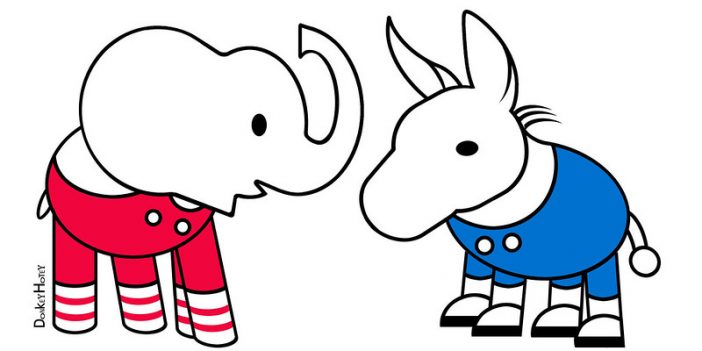
DIFFERENCE OF OPINION – Photo by DonkeyHotey on Foter.com / CC BY
Times change. The attitudes and technology of the recent past may look positively antiquated today, but time marches without mercy to the attitudes and fashions of our day. What is cutting edge today will seem positively silly to future generations. Here are my 10 predictions for the future:
ONE: People will become more tolerant of other people’s political difference. I know this is a radical idea, but maybe folks will begin to realize that we all have more in common than that which separates us into warring camps. This is already more apparent in the real world than on Facebook or in the Twittersphere, where people gather to share their outrage and insult anybody who dares disagree. It’s both boring and depressing. I could be wrong, but what’s the alternative? Civil War? It happened once before with tragic results for both sides. Let’s try to avoid it this time around.
TWO: People getting tattoos will become fewer in the years to come. Fashions come and go. Few people today are wearing their hair as they did in the 70s or wearing the same clothes. That’s because times change and people change with the times. Tattoos may fade and grow fuzzy over the years, but they or the dermabrasion scars to remove them are there forever.
THREE: Buffet restaurants will become No. 1 on the hit list of popular institutions. This one is extremely tough for me, but in a post-epidemic world, everybody dipping into the same French dressing tub and scooping up big globs of Joan’s Broccoli Madness with a common spoon is not going to be as popular as it once was – despite the presence of the much touted sneeze guard.
FOUR: Multiple remote controls for everything will end. It must. Currently we have two remote controls for the television – one from the cable company for changing channels. The other, which was included with the flat screen TV, we use to raise or lower the volume. I have to use the remote that came with the TV if I want to stream movies on Amazon, Netflix, BritBox or other pay channels.
Now I’m sure that I could integrate both TV remotes into one, but it would take hours to figure out and at the end I might not be able to access anything at all. The only good part is that my wife is even more frustrated than I am, so when she wants to change channels or watch something new, she has to rely on me – the man.
It’s the same thing with all my other remotes. One for the light and overhead fan in the living room, one for the bedroom, and if I were more technically sophisticated, I’d get an app on my phone so I could see who was ringing my doorbell, even if I was miles away.
I’m positive that our techie friends will solve this problem – they probably already have – and in the near future it will finally seep down to the folks on the ground. The one drawback, I suspect, is that they will also be able to tell when we turn on the lights, when we are home, and where we’ve gone when we’re not at home.
FIVE: One of the benefits to evolve from the current epidemic will be working electronically from home. There will be fewer reasons for office workers to get in cars and drive many miles in stop-and-go traffic in order to get to work. Fellow office workers will communicate electronically, each from their own home office area. There will be times to personally meet with one another, but these will be infrequent. People who work in retail or in service industries – beauticians, construction workers, plumbers, and restaurant folks – will still drive to work, but the giant traffic jams will ease.
Going to the store to shop for goods is already being impacted by the ease of Amazon, Instacart, and other internet shopping sites that deliver goods to our doorsteps within hours or days. With less commuting and less on-site shopping, there will be fewer reasons for brick-and-mortar stores and other businesses to maintain huge parking lots for their customers and employees and less need to build huge office buildings when most of the employees are working from home.
SIX: Family life will be enhanced or perhaps in some cases curtailed. With commuting to work a lesser factor, people will be able to spend more time at home. Hopefully what they will rediscover is the joy of family time. Or perhaps once folks begin spending more hours with their mates, they may find that whatever magic existed when they joined together has long since disappeared. The current epidemic is already bringing some of those feelings to the forefront.
SEVEN: The 40-hour work week may become less of a standard than it currently is. Freed from the wage-slave structure of going to the job every day, some folks will join the so-called “gig-economy” and work more or fewer hours as they desire at more than one job. When I was a boy, people usually worked a five-and-a-half day week. They would get off at noon on Saturday and have a half-day to go shopping and spend time with the family. Sundays were for church, and most stores would close down. The standard work week has ever since been stuck at 40 hours with stores staying open seven days a week. With more automation and fewer demands for employees, perhaps it will be time to restructure work to be a lesser part of everyday life.
EIGHT: Education is already changing, and it will soon change forever. Student loans – a government-backed scam by universities and banks – has left a generation of students in a state of perpetual bonded servitude after they graduate with a degree in fashion design or women’s studies and end up working at jobs next to debt-free high-school grads. Professors meanwhile are awarded tenure, which ensures them job security even if they turn out to be arrogant miscreants.
With some exceptions, secondary school curriculum – dominated by social activists and union educators – is almost as bad. Text books are written to be politically correct, if historically flawed. The basic skills, such as math, reading, and grammar, have been so diminished that students are getting high school degrees even though they may be functionally illiterate.
With education moving online, there is little reason for lecture halls full of bored students listening to bored professors drone on over materials that they have regurgitated scores of times before. If students are interested in the subject, they will be able to take it online from a top professor of their choice.
What’s happening already in the elementary schools is that an increasing number of parents are discovering the benefits of educating their children at home and passing along the values and attitudes that reflect their own. With more kids staying home from school the face of education can be expected to change greatly over the next few years.
NINE: Privacy is already a quirk of the past – neither expected nor respected by coming generations. People post their most intimate thoughts and emotions on the internet to share with the world. Cash transactions are rapidly becoming an artifact of the past. People use credit cards, debit cards, and internet accounts to purchase most of their everyday goods. That means there is an economic record of how they spend their money and what they spend it on residing in the database of large corporations and potentially accessible by the government.
TEN: The freedoms that Americans once took for granted have been under attack for decades. The computerization of information and the political need to control large populations are bound to lead to a further erosion of people’s ability to decide their own paths. There are already politicians choosing to place high taxes on large sodas and cigarette sales in order to engineer social health and attitudes. In China, people are granted “freedom” by the government if they exhibit government-approved attitudes and don’t make trouble. If they are trouble makers, they and their families may have to live with restricted rights. It is unfortunately seen as a model by our own ruling class.
Those are my predictions. I could be wrong. In fact, I hope I am wrong about some of them. So what do you think? Is the future going to be grim or rosy?
Or maybe somewhere in-between.
Do you have an opinion on the subject? Contact me at george@georgeleecunningham.com and let me know. Meanwhile, you can always subscribe and get an email reminder of blog postings. Your name will not be shared and you may cancel at any time.

